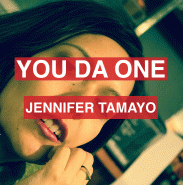
Book Review: YOU DA ONE by Jennifer Tamayo

YOU DA ONE
Poems by Jennifer Tamayo
Coconut Books, October 2014
ISBN-13: 978-1938055164
$18.50; 114 pp.
Reviewed by Simone Savannah
….
…..
The landscape of Jennifer Tamayo’s debut collection, YOU DA ONE, is spellbinding, mirroring the aesthetics of the Internet with its inclusion of spam and graphics. Tamayo cuts through the chaos in order to reveal a narrative about the speaker’s experiences and thoughts on the body. YOU DA ONE explores the ways in which the Internet creates and/or diminishes the body and other bodies that surround the self: “there is no WE here/there is barely an I.” appears several times throughout the collection, first in “There is a chemistry I want to know about like how you are mine in mine”.
At first, the spam from the Internet is alarming—AUTO FINANCING AVAILABLE. BAR CREDIT CAR LOANS 100% ACCEPTED. It seems to dominate the page and personal experience. But the juxtaposition of Internet spam with personal emails between the speaker and her family helps to draw the reader into a powerful space, where the language and aesthetics of modern technology meet and contaminate the body.
The Internet ads and email messages are not only evidence of the multiple spaces through which bodies must exist and attempt to connect, but also the multiple languages a body must consume in order to articulate or examine itself. In the airplane bathroom, Tamayo’s speaker is “more shit than body / every living thing, a pulp inside me” And the speaker’s father, whom she is on her way to Columbia to meet, might just be the father, or he might be the lover, “da one.” The father is an ambiguous, omnipresent body that the daughter obsesses over. In “Where is the shimmerwound,” Tamayo writes, “What is to have a penis that made me & I will want to look at it okay.” In several pieces, the speaker also investigates the self in relation to her father, making statements like, “I THOUGHT YOU WOULD LOOK LIKE ALFRED MOLINA WHY DON’T YOU LOOK LIKE ALFRED MOLINA?”. Such instances illustrate the speaker’s imagination immersed in and inundated by internet-based media that, again, enters and distorts the self.
& the thing that tumbles out of you
when you first see him
….
is not a part of you
but a version of you that the word defaults to
a verse of you that you saw on this one website
(from “When I was little I kept your picture under my pillow because I really wanted to and I thought that was what I was supposed to do and then when I lost it I only felt slight off”)
In this damage, the speaker’s anxieties about being and not being are revealed. Employing Rihanna’s voice not only in the title of her book, Tamayo’s speaker also asks, “what’s my name”—and she asks, “did you see me on the internet.” Additionally, the voice of Aime Césaire emphasizes the daughter’s otherness and the ways in which the daughter’s body and identity are constructed through gaze, language, culture, and memory. In “When We Please let’s match up birthmarks—the history is uttering,” Tamayo writes,
In the other’s language—the pang of the world falls on my metals
& my bowels slip and my bowels slip
I’m addressable. Even through time and bodies that are not my own, I’m addressable.
Several poems in YOU DA ONE also explore the Internet and society’s violence on the female body. In “Sick Bitch—by the daughter,” the speaker reveals an experience with bulimia, and Tamayo comments on the ideal female body by including a description of a female mannequin. She is aware and incredibly clear that media consumption is how a sick bitch gets made. Further, in poems like “I can be obsessed with this body because you can rightly say I made you” readers witness the speaker/daughter’s often-violent impulses to imagine or be a particular self in multiple spaces:
I skum magazines, blogs, my favorite books for the parts in which I can see myself & clutch me like a shard… –I want to clutch me. Trap my body between sounds and meaning…The stuffy is made up of machetes and I let the body drop most gracefully upon it.
YOU DA ONE not only asks what comes of the self on the Internet, but what comes of the self on the page or in a poem. In this fluid narrative of self-discovery, the daughter is obsessed with the violence of language.
Lay this book on my tits, my belly, my ankles & let the words hook on my skin until I am all fleshy. This feels wonderful & I feel alive.
Simone Savannah is from Columbus, Ohio. She is currently a PhD student in Creative Writing at the University of Kansas developing her interests in sexuality, Modern and Contemporary women’s poetry, and African American literature. Her work is forthcoming or has appeared in Big Lucks, Apogee, GlitterMOB, Powder Keg, and Blackberry: A Magazine.
